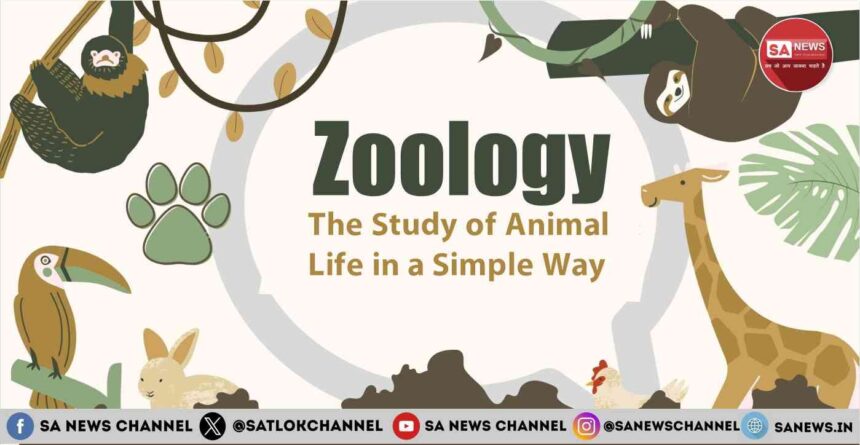Zoology is the science that studies animals. It helps us understand how animals live, grow, reproduce, and survive in nature. Zoology looks at animals from the smallest insects to the largest elephants. It teaches us not only about animals’ bodies but also about how they interact with each other and with their environment. Zoology is one of the most important branches of biology because animals are a huge part of the natural world.
- News in Zoology What’s passing moment?
- literal Background How Zoology Started
- Areas of Study in Zoology
- deconstruction or Morphology
- Taxonomy or Systematics
- Physiology
- Embryology or Experimental Studies
- progression
- Genetics
- Cellular and Molecular Biology
- Ecology
- Ethology
- General Trends in Zoology
- styles in Zoology How Scientists Study creatures
- Applied Zoology
- How Zoology Helps Us
- Challenges in Zoology
- Conclusion Why Zoology Matters for Everyone
- Spiritual Connection What Sant Rampal Ji Maharaj Teaches About creatures
In this blog, we will explore what zoology is, how it developed through history, what areas it covers, and how scientists study animals. We’ll also look at the tools used in zoology and how this science helps people and nature. This blog is written in simple English to make it easy for everyone to understand.
News in Zoology What’s passing moment?
Zoology isn’t just something people studied long ago. It’s still very important today. Scientists continue to learn new things about animals all the time. For example:
- Some animals are being rediscovered after people thought they were extinct for many years.
- New animal species are being found in forests, oceans, and deserts.
- Technology is helping scientists track animals better, such as using GPS collars on lions or small cameras on birds.
- Climate change is forcing animals to change their habits. Birds are migrating earlier; polar bears are struggling to find food.
- Scientists also use genetics to understand how animals evolved over millions of years. Some are even working on bringing back animals that disappeared long ago, like the woolly mammoth.
Zoology is not just about studying animals; it helps protect them too. Without zoologists, we might not know how to save animals from becoming extinct.
literal Background How Zoology Started
The study of animals isn’t something new. People have been watching animals for thousands of years. Ancient humans watched animals to hunt them, cultivate them, or keep them as pets. They drew pictures of animals on cave walls. Animals were important for food, clothes, and tools.
One of the first known scientists to study animals was Aristotle in ancient Greece. He wrote about animals and tried to put them into groups based on how they lived. For example, animals that live in water versus animals that live on land.
During the Renaissance (about 500 years ago), people started studying animals more seriously. Scientists like William Harvey helped us understand how the body works, such as how blood moves through veins and arteries. People began to explore the world and brought back stories of strange and new animals.
In the 1800s, Charles Darwin changed everything with his theory of evolution. He said animals change over time to survive better in their surroundings. His book, “On the Origin of Species,” is still very important in zoology today.
Areas of Study in Zoology
deconstruction or Morphology
Deconstruction studies the structure of animals, ranging from gross anatomical observations to tiny cellular structures. Comparative deconstruction, in particular, compares body structures across species, revealing evolutionary connections and adaptations. Morphology focuses on the form and structure of organisms, including their developmental changes over life cycles. Fossil morphology aids paleontologists in reconstructing extinct species and understanding evolutionary transitions, such as the movement from water to land.
Taxonomy or Systematics
Taxonomy classifies and names animals according to shared characteristics, forming the bedrock of biological organization. Systematics expands on this by studying evolutionary relationships through phylogenetics, constructing family trees (cladograms) that illustrate common ancestry. Modern systematics uses genetic sequencing, allowing scientists to revise groups based on molecular data rather than solely on physical traits. This field is vital for understanding biodiversity and conserving endangered species.
Physiology
Physiology examines how animals’ bodies function, from basic biochemical pathways to complex organ systems. It explores how animals regulate temperature, reproduce, digest food, and maintain homeostasis. Comparative physiology looks at adaptations across environments — how camels conserve water in deserts or how penguins thrive in polar climates. Insights from animal physiology often inform human medicine and biotechnology.
Also Read: British Raj: India’s Transformative Journey from Colonial Rule to Independence
Embryology or Experimental Studies
Embryology investigates the processes by which organisms develop from fertilized eggs to mature forms. Experimental biology has illuminated crucial mechanisms like gene regulation and morphogenesis, shedding light on diseases and evolutionary changes. Embryological studies reveal conserved patterns across species, suggesting deep evolutionary links — a principle famously illustrated in Haeckel’s embryo drawings.
progression
Evolutionary zoology examines how species change over time through natural selection, genetic drift, mutation, and gene flow. It explains the origin of species, adaptations to environments, and the vast diversity of life forms. Fossil records, molecular biology, and comparative anatomy combine in this field, supporting theories of common descent and providing a framework for understanding current biodiversity crises and future speciation trends.
Genetics
Genetics in zoology explores how traits are inherited, expressed, and modified within animal populations. Mendelian inheritance laid the foundation, but modern genetics extends into genomics, epigenetics, and gene editing technologies like CRISPR. Genetic studies help in conserving endangered species, understanding diseases, and unraveling complex behaviors linked to heredity. Population genetics also aids in tracking migration, breeding patterns, and evolutionary history.
Cellular and Molecular Biology
At the microscopic level, zoology intersects with cell biology and molecular studies to decipher how cells operate, communicate, and contribute to the organism’s overall function. Techniques like proteomics, transcriptomics, and molecular imaging reveal intricate cellular processes, providing insights into health, development, and disease in animals.
Ecology
Ecology examines animals within their ecosystems, studying interactions among species and between organisms and their environments. It addresses food chains, population dynamics, habitat requirements, and ecosystem services. Conservation ecology, a critical subfield, works to reduce human impacts on wildlife and habitats, seeking sustainable coexistence between people and nature.
Ethology
Ethology, the study of animal behavior, explores innate and learned behaviors, communication, mating rituals, migration, and social structures. Founded by figures like Konrad Lorenz and Niko Tinbergen, ethology bridges biology and psychology. Behavioral studies not only enhance understanding of animal welfare and domestication but also inform AI development and robotics through bio-inspired algorithms.
General Trends in Zoology
Contemporary zoology trends toward interdisciplinarity, blending traditional knowledge with advances in biotechnology, computational modeling, and environmental science. Focus areas include:
- Biodiversity conservation amid climate change
- Ethical considerations in animal research
- Integrating AI and machine learning for data analysis
- Citizen science and public engagement in conservation
- Urban zoology studying wildlife in human-dominated landscapes
styles in Zoology How Scientists Study creatures
Microscopy
Microscopy allows scientists to explore cellular and sub-cellular structures invisible to the naked eye. Electron microscopy reveals ultrastructural details, while fluorescence microscopy tracks specific proteins or DNA within cells. Advancements in imaging contribute profoundly to experimental biology, pathology, and cellular interaction studies.
Separation and sanctification ways
Biochemical analysis often requires separating molecules like proteins, DNA, or metabolites from complex biological samples. Techniques include:
- Chromatography (gas, liquid)
- Centrifugation
- Electrophoresis
- Spectrometry
Radioactive Tracers
Radioactive isotopes help trace the pathways of nutrients, hormones, and other molecules within organisms. They illuminate processes like metabolism, neural transmission, and ecological nutrient cycles. While their use has declined due to safety concerns, they remain valuable in specific physiological and ecological research areas.
Computers in Zoology
Computational tools revolutionize zoological research through:
- Data modeling (e.g., population dynamics, ecosystem simulations)
- Bioinformatics (e.g., genome sequencing, protein structure prediction)
- AI-based image recognition for species identification
- GIS mapping for habitat analysis and tracking animal movements
Such technologies enhance accuracy, broaden scope, and accelerate discoveries.
Applied Zoology
Applied zoology means using animal science in real life. Examples include:
- Protecting endangered animals
- Improving farming and animal care
- Helping doctors with medicines from animals
- Managing pests without harming nature
- Making laws to protect animals and habitats
Zoology also helps with new technology. For example, studying bats helps scientists design better robots or airplanes.
How Zoology Helps Us
Zoology is important in many ways:
- Protecting Nature: It helps us understand why animals matter and how to keep them safe.
- Better Farming: It helps farmers raise animals more healthily.
- Human Health: By studying animals, we learn about diseases and medicines.
- Education: It teaches people about life, respect for nature, and science.
- Technology: Animals inspire designs in engineering and technology.
Without zoology, many animals would be at greater risk of extinction. Also, humans might suffer because we rely on animals in many ways, from pollination of crops to discovering new medicines.
Challenges in Zoology
Even though zoology is very useful, it faces problems:
- Habitat loss because of buildings, farms, and pollution
- Climate change making animals’ lives harder
- Illegal hunting and fishing
- Lack of funding for research in some countries
Scientists are working hard to solve these problems, but it takes time and cooperation from people everywhere. Governments, communities, and individuals must all work together to protect animals and the environment.
Conclusion Why Zoology Matters for Everyone
Zoology isn’t just for scientists in labs or zoos. It matters to everyone. Understanding animals helps us understand our world and ourselves. Animals play huge roles in nature, from keeping forests healthy to pollinating crops. Without them, human life would suffer.
Zoology teaches us that all life is connected. By studying animals, we learn to respect life, protect our environment, and make smarter decisions for the future. The future of zoology looks exciting. New tools like AI, gene editing, and climate models will help us learn even more. But no matter how advanced science becomes, it all starts with a simple question: Why do animals do what they do?
In the end, zoology helps us see that we share this earth with millions of other living things. By understanding and protecting animals, we protect our future too.
Spiritual Connection What Sant Rampal Ji Maharaj Teaches About creatures
Sant Rampal Ji Maharaj teaches through the spiritual knowledge of true devotion (Satbhakti) that all living beings, whether humans or animals, are children of the same Supreme God (Kabir Sahib Ji). According to His spiritual teachings, animals also have souls and experience joy, pain, fear, and love just like humans. Thus, it’s our moral and spiritual duty to protect animals and treat them with kindness and compassion.
In His teachings:
- Killing animals for food is strictly forbidden. Non-violence and compassion towards all creatures are essential parts of true devotion.
- Animals are also trapped in the cycle of birth and death (84 lakh yonis). Only by receiving true spiritual knowledge (Satgyan) and following the correct spiritual path can souls — whether in human or animal form — achieve liberation and escape this painful cycle.
- Misusing animals for experiments, entertainment, or luxury is considered unethical because it goes against the law of nature and God’s commands.
Sant Rampal Ji Maharaj frequently emphasizes that humans must live in harmony with nature and animals. Protecting animals isn’t just science (like Zoology teaches); it’s also a spiritual responsibility.









